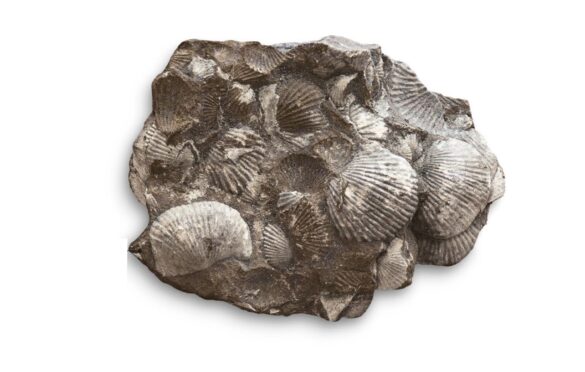Fossiliferous Shale

When it comes to the world of geology, few rocks are as captivating and scientifically significant as fossiliferous shale. In this comprehensive guide, we will delve deep into the composition, texture, origin, and the captivating world of fossils embedded within this sedimentary rock. Join us on this geological journey as we uncover the mysteries of fossiliferous shale.
What is Fossiliferous Shale?
Fossiliferous shale is a remarkable sedimentary rock that stands out due to its unique composition and its treasure trove of fossils. Comprising fine-grained particles, it shares similarities with other shales but sets itself apart with a high calcite content derived from the fossils it houses. Within its layers, you can expect to find complete fossils and detrital fossil fragments, each holding a piece of Earth’s ancient history.
| Property | Description |
|---|---|
| Group | SEDIMENTARY |
| Origin | Marine, Freshwater |
| Grain Size | Fine |
| Classification | Detrital |
| Fossils | Invertebrates, Vertebrates, Plants |
| Grain Shape | Angular |
The Texture of Fossiliferous Shale
One of the distinguishing features of fossiliferous shale is its fine-grained texture, making it an exceptional preserver of fossils. The fine detail preserved within this rock is a testament to its geological significance. Within the layers of fossiliferous shale, an array of fossils come to life with remarkable clarity. Common fossils found within this rock include brachiopods and mollusks, featuring ammonoids, bivalves, and gastropods. Notably, you’ll encounter arthropods like trilobites and the delicate structures of graptolites—rare treasures rarely found in coarser rocks. The diversity extends beyond the realm of marine life, as plants and vertebrates may also leave their imprints in fossiliferous shale.
The Origin of Fossiliferous Shale
Understanding the origin of fossiliferous shale is crucial to comprehending its place in Earth’s geological history. This sedimentary marvel typically forms under relatively shallow marine conditions. However, it’s not confined to marine settings alone; fossiliferous shale can also be unearthed in freshwater environments. The nature of the fossils discovered within the rock often serves as a valuable indicator of the environment in which it was born.
Fossiliferous Shale: A Geological Time Capsule
Fossiliferous shale is not merely a rock; it’s a portal to the past, a treasure chest of ancient life forms waiting to be unlocked. The fossils it cradles provide invaluable insights into Earth’s history, the evolution of species, and the conditions that prevailed during their existence.
Fossil Diversity in Fossiliferous Shale
Let’s take a closer look at the remarkable diversity of fossils found within fossiliferous shale:
1. Brachiopods
Brachiopods, with their distinctive shells and bilateral symmetry, are a common find in fossiliferous shale. These marine creatures have existed for hundreds of millions of years, leaving behind a rich fossil record.
2. Mollusks
The mollusk family is well-represented within fossiliferous shale, offering glimpses of ancient ammonoids, bivalves, and gastropods. These mollusks, with their intricately coiled shells and varying shapes, provide a fascinating window into prehistoric oceans.
3. Arthropods
Trilobites, those iconic arthropods of the Paleozoic era, make appearances in fossiliferous shale. Their distinctive segmented bodies and intricate exoskeletons are captivating specimens for both scientists and enthusiasts.
4. Graptolites
Graptolites, known for their delicate and branching structures, are a unique feature of fossiliferous shale. These organisms, which lived in colonial colonies and left behind intricate fossils, offer insights into ancient marine ecosystems.
5. Plants and Vertebrates
While primarily associated with marine life, fossiliferous shale can also surprise us with the presence of plant fossils and, in rarer instances, vertebrates. These findings shed light on terrestrial environments and the interaction between land and sea in Earth’s history.
Unveiling the Geological Significance
Fossiliferous shale stands as a testament to the ever-evolving story of our planet. By analyzing its composition, texture, and the fossils it contains, geologists gain invaluable insights into Earth’s geological history. Moreover, the presence of this rock in both marine and freshwater settings underscores the dynamic nature of our planet’s past.
Conclusion
In the realm of geology, fossiliferous shale is a captivating and informative subject. Its unique composition, fine-grained texture, and the diversity of fossils it harbors make it a valuable resource for understanding Earth’s history. As we continue to uncover fossils within fossiliferous shale, we unravel the mysteries of our planet’s distant past. It serves as a reminder that the Earth’s geological story is still being written, with fossiliferous shale as one of its most revealing chapters.
Sources:
- Geological Society of America. “Fossils in Shale.” https://www.geosociety.org/
- University of California, Berkeley. “Fossils in Shale: Preservation and Diversity.”
- American Museum of Natural History. “Trilobites: Fossil Record.” https://www.amnh.org
Read more on blog:
